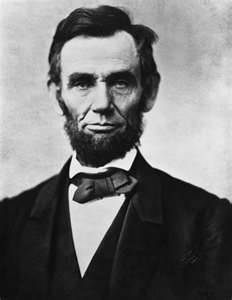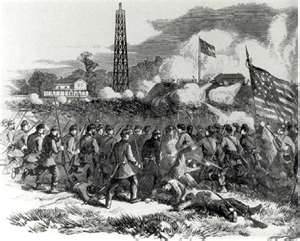The Life and Legacy of Abraham Lincoln
Part 3: Leader of the Free World Lincoln did not leave the public eye after that. He continued to speak out against the spread of slavery, including a famous speech in New Haven, Conn. The full text of the Lincoln-Douglas Debates was published in 1860, just in time for the presidential election campaign. Many Americans thought that the Republican nominee would be William Seward, a U.S. Senator from and former governor of New York, or perhaps Ohio's longtime Senator Salmon Chase. But it was Lincoln that the Republican Party chose at its convention, with Maine's Hannibal Hamlin named as the vice-presidential candidate. By this time, the Democratic Party, long full of disagreements between North and South over slavery, had split politically, forming two parties divided along geographical lines. John C. Breckinridge represented the Southern Democrats, and Lincoln's former Illinois foe Stephen A. Douglas represented the Northern Democrats. Another newly formed entity, the Constitution Union Party, put forward John Bell as its presidential standard-bearer. Out of this divided vote, Lincoln emerged the winner. Even though he received less than 40 percent of the popular vote, he won 180 of the available 303 electoral votes. The 16th President, he was the first to represent the Republican Party in the highest office in the land. His victory was short-lived, however, as South Carolina seceded from the Union on December 20, 1860. Mississippi, Florida, Alabama, Georgia, Louisiana, and Texas followed in the next few weeks. These seven states formed their own Confederacy and chose their own capital, Montgomery, Ala. They eventually named their own legislature and executive, Jefferson Davis.
Lincoln responded quickly, calling Congress into emergency session, calling for 75,000 volunteers to make up numbers in the Union armed forces, and implementing a blockade against Southern ports. He also instituted a host of other wartime powers, including suspending the writ of habeas corpus, meaning that people could be arrested with a warrant and held without having to be brought before a judge or jury. Four more states seceded in 1861: Virginia, North Carolina, Tennessee, and Arkansas. The first major battle of the war was in Virginia, at Bull Run/Manassas on July 21. This is generally regarded as a Confederate victory because the Union Army was in full flight back toward Washington, D.C. In what would become a recurring pattern, Lincoln changed top commanders in the Army of the Potomac, the main army in the eastern part of the country, from Irvin McDowell to George McClellan. McClellan had a grand plan for capturing Richmond, which by that time had become the capital of the Confederacy. The Peninsula Campaign was an encirclement strategy that proved so slow-moving that it never really got going with any kind of momentum. McClellan spent lots of time drilling and perfecting his troops' formations but not a lot of time on the battlefield. Lincoln repeatedly urged McClellan to attack. In the meantime, the Union lost another significant battle, again at Bull Run. Emboldened by this success, Confederate General Robert E. Lee">Robert E. Lee ordered his troops to cross into Maryland. At Antietam, McClellan finally heeded Lincoln's order and attacked, stopping the Confederate advance. This one-day battle resulted in 26,000 dead, wounded, or missing, the highest such total in U.S. military history. As before, though, McClellan turned cautious and did not pursue the retreating Army of Northern Virginia. Frustrated, Lincoln changed commanders again, naming Ambrose Burnside to the top job. Burnside went to work relatively quickly but marched his troops into a trap at Fredericksburg, Va., where Confederate troops were heavily fortified and not repulsed. On Jan. 1, 1863, Lincoln issued the Emancipation Proclamation, freeing slaves living in the Southern states. Since those states were technically outside the jurisdiction of the U.S. Government, the Proclamation had no immediate practical effect; however, as the Union claimed more Confederate territory, the Proclamation gradually went into effect. The Proclamation had great symbolic effect, however, and Lincoln came to be known as "the Great Emancipator."
Lincoln also changed top commanders in the east again, naming Joseph Hooker to command the Army of the Potomac. Hooker's first big chance was at Chancellorsville, Va., but the result was the same as with Burnside at the helm. In the Confederate victory, however, General Thomas "Stonewall" Jackson was wounded by friendly fire. Jackson, who had enjoyed great success harrying Union troops up and down the Shenandoah Valley, died a few days later. After these two successes, an emboldened Lee took the offensive, marching his troops into Pennsylvania. Union troops, under yet another commander, George Meade, met Confederate troops near the small town of Gettysburg. During a few days in early July, 1863, the Union won two significant victories. First, Meade's troops won the day at Gettysburg, stopping the Confederate advance and inflicting significant losses on Lee's army. Secondly, Grant captured Vicksburg, giving the Union control of the Mississippi River and cutting off the western Southern states from the rest of the Confederacy. From that point on, the war by and large turned to a war of attrition, and the Union superiority in manpower and machinery came more into focus. A few months after the battle at Gettysburg, Lincoln attended a dedication ceremony at a cemetery near the battlefield. At this ceremony, Lincoln delivered a short speech that has come to be called the Gettysburg Address. In less than two minutes, Lincoln encapsulated large ideas, like the ideals on which the country was founded and why the struggle to preserve the Union was so important, and more mundane concerns, like how best to remember the soldiers who gave their lives for a cause. It remains one of the most famous speeches in American history. Next page > And in the End > Page 1, 2, 3, 4 |
|
Social Studies for Kids
copyright 2002–2024
David White



 Meanwhile, Lincoln made his way to Washington, D.C., for his inauguration. Warned of a possible assassination attempt, he traveled by train at night a few weeks early. On March 4, 1861, he took the Oath of Office. Less than two months later, the Civil War had begun, with
Meanwhile, Lincoln made his way to Washington, D.C., for his inauguration. Warned of a possible assassination attempt, he traveled by train at night a few weeks early. On March 4, 1861, he took the Oath of Office. Less than two months later, the Civil War had begun, with  The war was not being fought only in the east. Out west, a Union general named
The war was not being fought only in the east. Out west, a Union general named 
